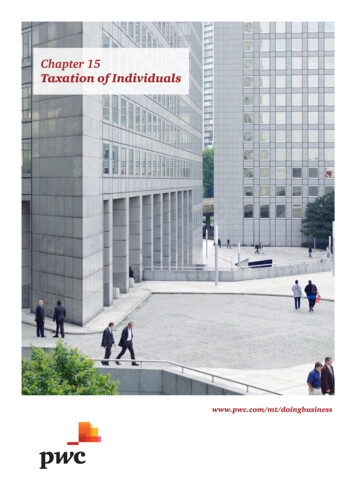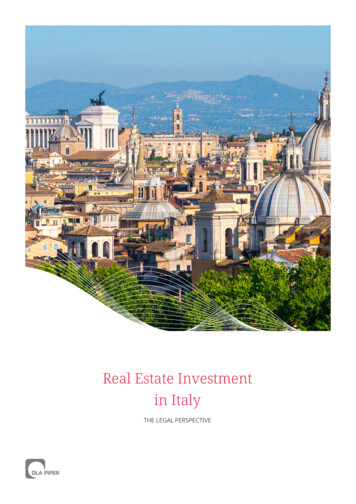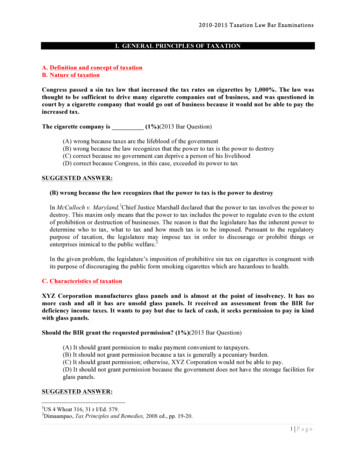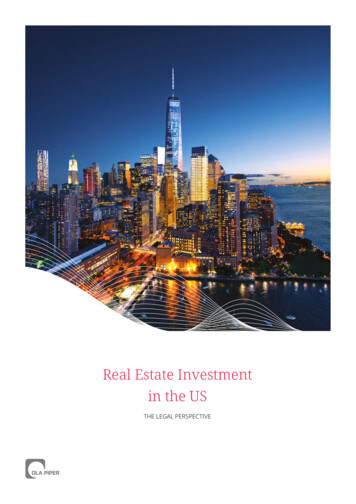
Transcription
Chapter 15Taxation of Individualswww.pwc.com/mt/doingbusinessDoing Business in Malta
The tax system applicable to individualsThis Chapter deals with the special provisions and furtherconsiderations applicable to the taxation of individuals inaddition to the general rules discussed in Chapters 13 and14.Basis of taxation of individualsAn individual who is ordinarily resident and domiciled inMalta is subject to tax on his world-wide chargeable income(including certain capital gains).An individual who is not ordinarily resident or notdomiciled in Malta, is subject to tax in Malta on chargeableincome and certain capital gains arising in Malta and onchargeable income arising outside Malta only if it is receivedin Malta. Foreign capital gains are not taxable in Malta, evenif received in Malta. This is not applicable to individualswho are married to persons who are resident and domiciledin Malta.Non-residents / temporary residents are only subject to taxin Malta on chargeable income and certain capital gainsarising in Malta.A temporary resident is any person who is in Malta for sometemporary purpose only and not with any intent to establishhis residence in Malta and who has not actually resided inMalta for a period equal to six months in a calendar year.A person is ordinarily resident in Malta if he is regularlyresident over a number of years. An ordinary residentceases to be resident in Malta if he is absent from Malta incircumstances that, in the opinion of the Commissioner forRevenue, are inconsistent with the status of resident. Thefactors that would be taken into account for this purposeare the duration of the absence and the connections that theindividual may have retained with Malta.Domicile is a term of private international law. Anindividual usually acquires the domicile of his parents onhis birth but he may acquire a domicile of choice in anothercountry if he is present in that country with the intention ofremaining there permanently.Rates of taxIndividuals are, as a rule, subject to tax at progressive rates.There are different scales of rates for different categories ofindividuals, as shown in Appendix IV. The maximum rate is35%.Taxable incomeTaxable capital gains, which were not subject to final tax,must be reported together with the taxable income and taxis levied on the total amount. Individuals may qualify forcertain exemptions, including an exemption from tax oncapital gains derived from the sale of immovable propertythat had been owned and used as the taxpayer’s soleordinary residence for at least three years.PwC Malta 1Employment income includes the value of any fringebenefits, determined in accordance with the Fringe BenefitsRules. Any benefit provided by reason of employment byan employer or a related company to an employee or toa member of his family is deemed to constitute a fringebenefit. The use of a company car or a car allowance, theuse of company property, the provision of free or subsidisedlodging and free non-business travel are among the fringebenefits specifically regulated by the Rules.When a company grants an option to its employees toacquire shares, such share options become taxable onlywhen the option is exercised. In this respect, the value of thesaid share option would be 42.85% of the excess of the pricewhich the shares would fetch in the open market on thedate of the exercise of the option over the option price of thesame shares, subject to the conditions contained in the saidRules. Any gain realised from the transfer of shares acquiredthrough the exercise of a share option constitutes a capitalgain and should be taxable.A number of specified benefits are exempt under certainconditions, such as health insurance and the use of acomputer and related equipment. Employment income(including the value of fringe benefits) is subject to taxdeduction at source under the Final Settlement System.Individuals are not required to report dividends receivedfrom companies resident in Malta. Individuals who opt toreport dividends that fall below the relevant thresholds willbe taxed on the amount of the distributed profits gross ofany tax and will qualify for a credit of the tax paid by thecompany in respect of such distributed profits. This creditmay result in a refund to the shareholder. Dividends paidout of profits allocated to the Final Tax Account shall notbe charged to further tax and shall not form part of thechargeable income of any person. The tax withheld onprofits allocated to the Final Tax Account cannot be subjectto a credit/refund to the shareholder.Individuals have the option to receive investment incomewithout withholding tax, in which case they will be requiredto report the income in their tax return and be taxed at theirpersonal rates. Investment income that has been subject tofinal withholding tax will not be subject to further tax andshould not be reported in the tax return.Individuals may qualify for certain deductions includingdeductions in respect of alimony paid to an estrangedspouse, private school fees, childcare fees, homes for theelderly fees, sports fees and cultural activities fees. Thereare no personal allowances, but the tax rates of residentindividuals include a tax-free portion in an amount thatvaries according to whether the individual is taxed as amarried, parent or single person.A specimen tax computation for individuals is provided inAppendix V.
Married, parent or single tax ratesThe income of a married couple living together (whichincludes two partners who have registered their partnershipas a civil union) is treated as the income of one taxpayerbut for the purpose of calculating the tax payable thespouses may opt for a separate computation. In a separatecomputation, the earned income of each spouse is taxed asif it were derived by a single person. The unearned incomeof both spouses is treated as the income of the spouse withthe higher amount of earned income. Under a separatecomputation, the income of each spouse qualifies for thetax free portion applicable to single taxpayers and is taxedat the single or parents rates. However, the spouses are stillrequired to file one tax return. It is up to the married coupleto decide who is the responsible spouse for tax purposesbut the spouses are jointly and severally liable for their taxobligations and liabilities.Parent rates can be claimed by individuals who maintainunder their custody a child, or pay maintenance in respectof their child, where such child is less than 18 years old(or between 18 and 23 years of age if receiving full-timeinstruction at any university, college or other educationalestablishment) and is not gainfully occupied, or if gainfullyoccupied, does not earn more than 2,400 per annum.Individuals who are widowed, separated or divorced shouldfile a separate tax return and be taxed at single or parentrates (or at married rates if they are single parents andsatisfy certain conditions).Global Residence Programme (GRP) /Residence Programme Rules (RP) RulesThe GRP Rules are applicable to third country nationals(i.e. non EU, EEA or Swiss nationals) while the RP Rules areapplicable to EU, EEA and Swiss Nationals. Individuals whoare granted the GRP / RP status and their dependents aretaxable on income and certain capital gains arising in Maltaand foreign income received in Malta. Foreign incomereceived in Malta by the beneficiary and certain dependentsis subject to tax in Malta at a flat rate of 15%, subject to aminimum tax of 15,000 per annum, after double tax relief(if any). Other taxable income that is not covered by theseRules is charged separately at the rate of 35%.Persons applying for this scheme must satisfy a number ofconditions, as listed in the Rules, including amongst othersthe requirement to purchase or rent immovable propertyin Malta (subject to certain minimum thresholds as toacquisition or annual rental cost of such property), to bein possession of health insurance, and not to reside in anyother jurisdiction for more than 183 days.A non-refundable one-off registration fee, must be paidupon submission of the application amounting to 6,000or 5,500 depending on where the property is located. Anapplication for the special tax status must be made throughthe service of a person that qualifies as an “AuthorisedRegistered Mandatory”.The above arrangement replaces the tax rules otherwiseapplicable to Resident Scheme Certificate holders andHigh Net Worth Individuals Certificate holders. However,persons already qualifying under those arrangements maycontinue to qualify under the old Rules subject to certainconditions being satisfied.Doing Business in Malta2
Malta Retirement Programme (MRP)Retirees who are EU, EEA and Swiss nationals who are notin an employment relationship and who receive a pensionas their regular source of income may apply to benefit underthe MRP.To qualify for the MRP, the retiree must satisfy a numberof conditions as laid down in the rules, including that thepension income of the retiree must be wholly remitted toMalta and must constitute at least 75% of the individualincome chargeable to tax in Malta; the individual must ownor rent immovable property exceeding certain amounts asspecified in the rules and such property must be occupiedby him as his principle place of residence world-wide; theretiree must reside in Malta for at least 90 days averagedover a five year period and should not reside more than183 days in any other jurisdiction. Furthermore, theretiree would not be able to apply for this scheme if he isbenefitting from another tax scheme or if he is domiciledor intends to establish his domicile in Malta within 5 yearsfrom the date of the application.An individual who is granted a special tax status underthe MRP will be subject to tax in Malta at 15% on anyforeign income received in Malta, subject to a minimumtax of 7,500 annually and a further 500 in respect ofevery dependent and special carer. This special tax rate isextended to the dependents of the beneficiary. Any otherchargeable income will be taxed at 35%.Any capital sum received by way of commutation of pension(up to a maximum of 30% of the total pension) is exemptfrom Maltese income tax even if remitted to MaltaUnited Nations Pensions Programme Rules(‘UNPP’)Individuals who are not Maltese nationals and are in receiptof a UN pension or a widow’s / widower’s benefit, of whichat least 40% is received in Malta may benefit under theUNPP.In order to qualify for this special status, the applicantmust satisfy a number of conditions including, own or rentimmovable property in Malta; be in possession of healthinsurance, which covers himself and his dependants; canadequately communicate in either Maltese or English.An individual who has been granted the special tax statusmust comply with continuing obligations on a yearly basis,including not residing in another jurisdiction for more than183 days in a calendar year and not benefit from any otherscheme.Once the special tax status has been acquired, the personis taxable in Malta on income and certain capital gainsarising in Malta and foreign income remitted to or receivedin Malta. The UN pension income or Widow’s or Widower’sbenefit, as the case may be, received in Malta is exemptfrom Maltese tax. All other income arising outside Maltawhich is received in Malta by the beneficiary and certaindependents is taxable at the rate of 15%, with the possibilityof claiming double tax relief on such income and subject tothe minimum annual tax liability of 10,000 per annum. Anadditional 5,000 per annum must be paid if both spousesare in receipt of a UN pension. Income of the beneficiary andcertain dependents that do not fall within the purport ofthese rules is charged as separate income at the rate of 35%.A non-refundable one-off registration fee of 3,500 must bepaid.PwC Malta 3
Returned migrantsPersons born in Malta who return to take up residencein Malta may opt for a special tax regime. The option isopen to persons who have been absent from Malta for anaggregate period of not less than 20 years during the last 25years prior to returning to Malta; or to persons who are notMaltese nationals and who satisfy certain minimum capital/income levels and remittance conditions.An individual who takes the option is taxed on income andcapital gains arising in Malta and on foreign source incomewhich is remitted to Malta even though such individual maybe domiciled in Malta. No tax is charged on capital gainsarising outside Malta even if remitted to Malta.A returned migrant availing himself of this option, will betaxed on foreign income received in Malta at a flat rate of15% (with a tax free portion), subject to a minimum annualtax liability of 2,325, after double taxation relief. Otherincome derived by the returned migrant would be taxedseparately, taking the foreign income received in Malta asthe first part of the income with any residual income beingtaxed at the applicable standard rates up to a maximum of35%.One of the conditions that should be satisfied to elect forthe returned migrant scheme is that the returned migrantshould receive in Malta at one or more times during the yearimmediately preceding the year of assessment an amount ofincome of not less than 14,000 arising outside Malta,suchminimum remittance is increased by 2,400 for everydependant). Such income shall be deemed to constitute thelast part of the individual’s total income for the relative year.Highly Qualified Persons / QualifyingEmployment in Aviation‘Beneficiaries’ in terms of the Rules, engaged in anemployment activity constituting an ‘eligible office’ andderiving income payable from a ‘qualifying contract ofemployment’, who did not benefit from the exemptionsavailable to the investment services and insuranceexpatriates, may opt to be subject to tax on such incomeat a flat rate of 15% without the possibility to claim anyrelief, deduction, reduction, credit or set-off of any kind.Other chargeable income of the beneficiary is charged to taxseparately at the rates applicable to resident individuals buttaking the said income as the last part of the total income ofthe individual. Qualifying income in excess of 5,000,000 isexempt from tax in Malta.Employment with companies licensed and/or recognisedby the Malta Financial Services Authority (MFSA), theLotteries and Gaming Authority (LGA) and Transport Maltawith respect to undertakings holding an air operators’certificate and consisting of specified senior positionsis considered as an ‘eligible office’. Income, excludingany fringe benefits, arising from such office must be of aminimum of 75,000 p.a. ( 45,000 for aviation) adjustedannually in line with the Retail Price Index.This arrangement applies for a consecutive period of fiveyears for EU/EEA/Swiss nationals with the option for a onetime extension of five years to their qualifying period, andfor a consecutive period of four years in the case of thirdcountry nationals. Furthermore, third country nationals,who have a qualifying employment in aviation, may alsoapply for a one-time extension of four years (subject toconditions).The standard tax rates will apply after the lapseof such periods.Doing Business in Malta 4
Qualifying employment in Innovation andCreativity RulesThe applicant must be engaged in an employment activityconstituting an ‘eligible office’ and is directly engagedin industrial research, experimental development,product development, product design, product or processinnovation or senior management; and must have obtainedMalta Enterprise Corporation approval.In order to qualify for this special status, the applicant mustbe an individual who is not domiciled in Malta; derivesemployment income in respect of work or duties carriedout in Malta; is protected as an employee under Malteselaw; is in possession of the required specific competentprofessional qualification; is in receipt of stable and regularresources which are sufficient to maintain himself and themembers of his family without recourse to Malta’s SocialAssistance System; resides in accommodation regarded asnormal for a comparable family in Malta; is in possession ofvalid travel documentation; and is in possession of sicknessinsurance covering applicant and his/her family.Employment income should be of not less than 45,000(excluding the annual value of fringe benefits) in respectof a year of assessment, adjusted annually in line with theRetail Price Index. Such income is taxed at a flat rate of 15%and income in excess of 5,000,000 is exempt from tax inMalta.This option is available for a period of 3 consecutive yearsfor EEA, EU, Swiss Nationals and third-country nationals.However, third country nationals must not physically stayin Malta in the aggregate, for more than 1,460 days. Thisoption commences in the year in which the recipient is firstliable to income tax in Malta. These rules shall cease to haveeffect on 31 December 2017.Repatriation of Maltese Persons establishedin a Field of Excellence RulesAn individual who is established in a field of excellence andreturns as an ordinary resident in Malta may opt to havehis income from employment exercised in Malta charged totax at the rate of 15%, provided that he has been ordinarilyresident in Malta for at least twenty years but has not beenordinarily resident in Malta for the ten consecutive yearsprior to his return, and subject to terms and conditions.PwC Malta 5Employment income of the eligible individual should be ofnot less than 75,000 (excluding the annual value of fringebenefits) in respect of a year of assessment.This option shall apply for a consecutive period of 5 yearscommencing from the year preceding the first year ofassessment in which that person is first liable to tax underthe provisions of the Act after returning to reside in Malta.Taxation of income derived from a sportsactivityIncome derived by a full-time or a part-time “registeredplayer or athlete” or “licensed coach” from a sports activity(i.e. a sports recognized by the Kunsill Malti ghall-Isport andwhich is practiced wholly or mainly in Malta), may opt to betaxable on such chargeable income at a flat rate of 7.5%.Payments to non-resident entertainersIncome derived by a non-resident from the provision ofentertainment activities in Malta, where entertainmentactivities are carried out in Malta for a period not exceeding15 days, is taxed at a flat rate of 10%.Individuals employed outside MaltaIndividuals who are subject to tax on their world-wideincome may qualify for a special tax rate of 15% on incomederived from employment outside Malta. In calculating thetax due, the overseas employment is to be treated as the firstpart of the income with any residual income being taxed atthe applicable standard rates up to a maximum of 35%. Thisrate applies if the assignment requires the performance ofduties wholly or mainly outside Malta and such terms arereflected in the relative contract of employment.
www.pwc.com/mt/doingbusiness 2018 PricewaterhouseCoopers. All rights reserved. PwC refers to the PwC network and/or one or more of its member firms, each of which is a separate legalentity. Please see www.pwc.com/structure for further details.Doing Business in Malta
A person is ordinarily resident in Malta if he is regularly resident over a number of years. An ordinary resident ceases to be resident in Malta if he is absent from Malta in circumstances that, in the opinion of the Commissioner for Revenue, are inconsistent with the status of resident. The factors that would be taken into account for this purpose











